Understanding the optimal age for kittens to separate from their mother is a pivotal aspect of responsible feline care. Veterinarians stress the importance of this period in shaping the kittens' future well-being.
Factors such as socialization, weaning, and overall development play a crucial role in determining the ideal time for this transition. By following expert recommendations, caregivers can ensure a smooth and successful process for both the kittens and themselves.
The intricacies of this timeframe shed light on the significance of making informed decisions that prioritize the kittens' health and overall growth.
Key Takeaways
- Kittens should ideally stay with their mom and littermates for 8-10 weeks for proper development.
- Socialization with littermates and mom between 4-7 weeks is crucial for well-adjusted behavior.
- Weaning process should start around 4 weeks, with a gradual transition to solid food for independence.
- Early weaning can lead to behavioral issues and may require extra care and socialization for orphaned kittens.
Optimal Timeframe for Kittens Leaving Mom
Ideally, kittens should remain with their mother and littermates for a recommended period of 8 to 10 weeks to ensure proper bonding, development, and socialization. During this critical timeframe, kittens learn essential skills from their mother and littermates, such as food acceptance and fear response.
This period also allows for the development of crucial socialization behaviors that are essential for well-adjusted behavior in adulthood. Kittens that stay with their mother for the full 8 to 10 weeks tend to exhibit more confidence, better coping mechanisms, and improved social skills.
Therefore, it is highly advised to respect this natural timeline to set the kittens up for a healthy and well-adjusted life.
Importance of Socialization Period
The socialization period between 4-7 weeks of a kitten's life plays a crucial role in shaping their future behavior and interactions. During this time, kittens learn important social skills and behaviors from their mother and littermates that are essential for their overall development. A well-socialized kitten is more likely to grow up as a confident and well-adjusted cat, capable of forming positive relationships with humans and other animals. Here is a visual representation of the key aspects of the socialization period:
| Key Aspects of Socialization Period | ||
|---|---|---|
| Exposure to different environments | Learning proper play behavior | Interaction with humans and other animals |
Weaning Process and Guidelines

During the weaning process, kittens gradually transition from nursing to solid food, marking a significant milestone in their development. This crucial phase typically starts around 4 weeks of age when kittens begin showing interest in exploring solid foods.
To ensure a smooth transition, follow these guidelines:
- Offer a mixture of water and either dry kibble or canned food in a ratio of 1-to-3.
- Create a separate feeding area away from the mother with food placed on a flat saucer to encourage independence.
- Monitor the kittens closely during this period to ensure they are adapting well to the new diet and gaining the necessary nutrition for their growth.
Risks of Early Weaning
Moving from the weaning process to the risks associated with premature separation from the mother, early weaning can have detrimental effects on a kitten's behavioral and social development. Kittens weaned too early may lack crucial social skills taught by their mother, leading to issues like aggression, anxiety, and fear.
The absence of proper weaning can result in oral fixation tendencies and imprint behavioral problems that persist into adulthood. Furthermore, kittens separated prematurely may require surrogate parenting to compensate for the lack of maternal care.
To mitigate these risks, it is imperative to adhere to the recommended weaning timeline of 8-10 weeks to ensure kittens receive essential socialization and behavioral training from their mother.
Considerations for Independence

Considering factors such as the mother cat's preferences and individual cat behaviors, evaluating the appropriate timing for a kitten to gain independence becomes essential in ensuring a smooth transition. Some key considerations include:
- Maternal Bond: Understanding the mother cat's desire for independence from her kittens.
- Kitten Behavior: Observing the readiness of kittens to explore and interact independently.
- Social Dynamics: Recognizing how the interactions between littermates and the mother influence the independence process.
Living Arrangements for Kittens
Ensuring appropriate living arrangements for kittens involves understanding the dynamics of their relationships within the family unit and considering individual cat preferences for independence.
While it is generally acceptable for kittens to grow up and live with their mother, some cats may prefer more independence from their kittens. Individual cat preferences vary, and cat moms may exhibit differing levels of desire for their kittens to become independent over time.
The decision regarding the living arrangements of mom cats and kittens should be based on the specific needs and behaviors of the individuals involved. Providing a safe and comfortable environment that meets the needs of both the mother cat and her kittens is essential for their well-being and development.
Adoption Timing Recommendations

Understanding the optimal timing for adoption plays a crucial role in ensuring the well-being and behavioral development of kittens as they transition from their initial bonding period with their mother and littermates.
When considering adoption timing, it is recommended to:
- Wait for 8-10 weeks: Ideally, kittens should stay with their mother and littermates for this duration to learn crucial social and behavioral skills.
- Consider adopting siblings together: If possible, adopting siblings together can provide comfort and companionship during the transition to a new home.
- Implement positive reinforcement training: Utilizing positive reinforcement techniques early on can help shape desirable behaviors and promote a healthy bond between the kitten and their new family.
Frequently Asked Questions
Can Kittens Develop Behavioral Issues if They Are Separated From Their Mother Too Early?
Early separation from the mother can lead to behavioral issues in kittens, impacting their socialization and emotional development. Kittens should ideally stay with their mother for 8-10 weeks to learn crucial skills and behaviors.
How Can Surrogate Parenting Skills Be Developed in Kittens Who Are Weaned Too Early?
Developing surrogate parenting skills in kittens weaned too early involves fostering trust, providing comfort, and mimicking maternal care. Consistent socialization, interactive play, and positive reinforcement techniques help kittens adapt, reducing behavioral issues and promoting emotional well-being.
Are There Long-Term Consequences for Kittens Who Are Not Properly Socialized During the Critical 4-7 Week Period?
Inadequate socialization during the critical 4-7 week period can lead to long-term consequences in kittens, including heightened aggression, anxiety, and fear. Proper socialization is essential for fostering well-adjusted behavior and reducing behavioral issues in the future.
What Are Some Signs That a Kitten May Be Ready to Be Weaned Onto Solid Food?
When considering weaning kittens onto solid food, signs of readiness include curiosity towards food, decreased nursing frequency, and ability to lap water. Proper weaning process at around 4 weeks fosters independence and essential behavioral skills.
How Can Adoptive Families Ensure a Smooth Transition for Kittens Leaving Their Mother and Littermates?
To ensure a smooth transition for kittens leaving their mother and littermates, adoptive families should provide a safe and comfortable environment, offer consistent positive reinforcement training, gradually introduce new routines, and monitor for any signs of stress or adjustment difficulties.
What Is the Recommended Age for Kittens to Be Adopted?
The recommended age to adopt a newborn kitten is around 12 weeks. At this stage, kittens have typically been weaned from their mother and have learned important social and behavioral skills. Waiting until this age ensures that the kittens are ready for the transition to a new home and family.
Conclusion
In conclusion, adhering to the veterinarian-recommended timeframe of 8-10 weeks for kittens to leave their mother is crucial for their well-being and development. This period allows for essential bonding, socialization, and weaning processes to take place, ensuring the kittens' physical health and emotional stability.
Caregivers should prioritize the kittens' needs and consider the risks of early weaning, as well as provide a suitable living environment for their growth and independence.




